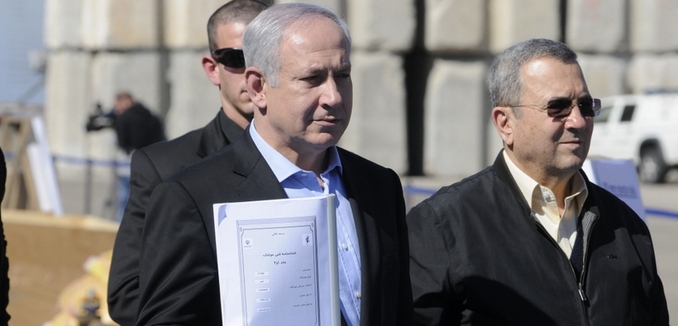In an analysis appearing Friday in the Times of Israel, The Conciliatory Conservative, political correspondent Haviv Rettig Gur writes that Prime Minister Benjamin Netanyahu did not “willingly go to war without first taking great pains to ensure Israel’s overseas allies understand the need.”
Rettig Gur compares Netanyahu to Prime Minister Levi Eshkol, who led Israel during the Six-Day War in 1967:
In the run-up to the 1967 war, Moshe Dayan and the IDF top brass counseled an immediate strike to regain the initiative after Egypt’s mid-May deployment of troops into the Sinai and subsequent May 22 closure of the Straits of Tiran. But Eshkol held back for two long weeks, the infamous “waiting period,” sending frantic messages (along with foreign minister Abba Eban) shuttling between Western capitals.
That delay, which cost Eshkol dearly at home, generating so much public disquiet that he was forced to appoint the ex-general Dayan as defense minister on June 1, paid off handsomely once hostilities began. The IDF had used the time to complete a full reserve call-up and to train the air force in precisely the sort of air raids against enemy landing strips that would prove so decisive in the first days of the war. And in retrospect, Eshkol’s careful coddling of Washington during this period appears to have been the decisive factor in the Johnson White House’s willingness to delay any UN action against Israel during the fighting, and even to ward off a direct Soviet threat to intervene on the Syrian front.
This parallels Netanyahu’s actions earlier this week:
For days, [Netanyahu] reined in the IDF, withstood a growing chorus of anger and resentment from some of his ministers (and, it must be said, residents of the rocket-battered south) and worked to explain Israel’s predicament to world leaders.
On Monday, that restraint cost him dearly, as Liberman led his 11-seat Yisrael Beytenu party out of its shared Knesset list with Likud, reducing the prime minister’s ruling faction from 31 seats in the 120-member Knesset to just 20 — on the pretext of “fundamental” disagreements over Netanyahu’s handling of Gaza.
But the delay allowed Netanyahu to garner international support for Operation Protective Edge. Even United Nations Secretary General Ban Ki-Moon called further escalation “preventable only if Hamas stops rocket firing,” put the onus on Hamas to stop attacking Israel.
This international support is something that the Prime Minister reiterated today in a statement.
I made this point – and many others – clear in recent days in the conversations I have held with major world leaders. I had a good conversation last night with US President Barack Obama, also with Russian President Vladimir Putin. I had good talks with all of them, with German Chancellor Angela Merkel, Canadian Prime Minister Stephen Harper and British Prime Minister David Cameron, and of course with French President Francois Hollande. To all of them I said something simple – no country would accept its civilians being fired at without a harsh response. I said that I would not allow Israel’s citizens to live in this reality. No international pressure will prevent us from operating with full force against a terrorist organization that calls for our destruction.
Another factor that may be helping Netanyahu and Israel is that with Iran vocally backing Hamas, the Sunni Muslim world has been somewhat muted in its criticism of Israel.
Rettig Gur’s general point about Netanyahu’s restraint to go to war has been observed by a number of Israeli columnists, not all of whom are usually favorably disposed towards Netanyahu. Towards the end of his analysis, Rettig Gur describes Netanyahu as “[a]n MBA who prides himself on his careful stewardship of Israel’s prospering economy, Netanyahu does not relish the uncertainties and inevitable unintended consequences of war.” Keeping that in mind, he predicts that if Netanyahu feels the need to launch a ground war to defend the country effectively, “everything in his long record of public service suggests the campaign will be precisely calibrated, limited in scope, and as brief as can be managed.”
[Photo: Israel Defense Forces / WikiCommons ]




